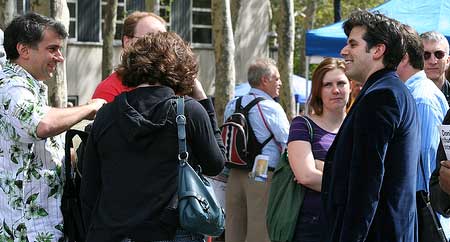A good seventy people, composed of a handful of students and a majority of people over forty, congregated in the third floor lecture hall of the Columbia Journalism Building on Tuesday night. A portrait of Joseph Pulitzer hung behind the five panelists, as if to ask, “What hath Steve wrought?”
The panel, purportedly dealing with the crisis of book reviewing, might very well have been entitled “How to Interpret Steve Wasserman’s ‘Goodbye to All That.’” Wasserman came under fire from the Philly Inquirer‘s Carlin Romano and Public Affairs‘ founder Peter Osnos for an elitism that they had discerned in his piece.
“When I hear the word ‘elitism,'” said Wasserman, during one of the panel’s many heated moments, “I want to reach for my revolver.”
Every panel contending with a crisis, whether tangible or perceived, needs a whipping post. There are, after all, crises to justify. Litblogs, rarely mentioned during this ninety minute conversation, escaped the pillory this time. The venom was directed at the frequently misunderstood Wasserman. Romano suggested that there was an elitist strain in his CJR piece and declared that it was a journalist’s duty to write to as many people as possible, speaking in as many voices as possible. Responding to a point about anti-intellectualism being a part of American life, Romano remarked upon the “anti-Americanism in intellectual life,” noting that there was too much snobbery from major cities.
“Come down off your high chairs and talk in language they understand,” pleaded Romano.
Osnos declared that Wasserman was someone you wanted in your editorial foxhole, but suggested that the question that any incoming book reviews editor should ask of executives was “How much is is it worth to have people who read books read newspapers?” Osnos suggested that the answer didn’t lie in 800 word book reviews, but in word-of-mouth communities. He cited the Oprah effect and pointed out that USA Today‘s book coverage often received scant attention, despite the fact that it was designed to be read by ordinary people.
Wasserman, answering with a barely contained fury, then championed “the intelligence and avidity of ordinary readers” and perceived in Romano’s statement a condescending hubris in talking down to a readership. “Criticism is not a species of selling,” he said.
Romano then observed, perhaps in an assault upon Wasserman’s vernacular, that 1,400 word reviews written in pretentious Latinate carried a decidedly elitist strain and that real reviewing that reached the people could be found through such critics as the Boston Globe‘s Gail Caldwell. Wasserman noted that he barely recognized himself in Romano’s straw man, openly wondering how he could conflate intelligent reviewing with elitism.
This all made for great fireworks, but one of the panel’s many problems was that it was fixated upon a media environment more reminiscent of 1997 than 2007.
Elisabeth Sifton, senior vice president of Farrar, Straus & Giroux, openly bemoaned the anti-intellectual quality of American culture, and then proceeded to declare the Internet’s “information” pursuit, “A very narrow goal, I may say!” I wondered if Sifton was even aware of such sites as The Valve, much less many of the countless pockets of wisdom that could be found with little to no effort.
“How many of you listen to public radio?” asked Osnos of the crowd. A good 95% of the audience raised their hands. Osnos then cited this as an example of how the media had found a way to reach a substantial and important audience through radio and how this had been an unthinkable supposition thirty years ago. I wanted to ask Osnos if he or any of the other panelists used an iPod.
At least Mark Sarvas was open about the technological chasm. He observed his nephew’s stunning dexterity with text messages, cited a grammatically mangled sentence that had appeared in a print publication, and observed the Guardian‘s audience of 23 million, positioned through its online reorganization. He had choice words to say about the Los Angeles Times‘ failure to obtain a synthesis between print and online, citing the “failure of imagination” in its execution.
Of all the participants, Osnos rubbed me the wrongest way. His efforts to reach the American public seemed more predicated upon reaching a demographic to sell them content, rather than the intelligent journalism Wasserman was calling for. While maintaining any journalistic outlet certainly involves reaching an audience and maintaining a business, I was glad to see Victor Navasky remind the panel during the Q&A session that nearly every op-ed journal was losing money.
I was more in the Wasserman camp than I realized. But then the idea of underestimating an audience’s intelligence has never particularly appealed to me. (Earlier in the evening, I had a conversation with a marketing person who kept referring to a book’s readership as a “customer base,” and I felt compelled to remind this person that these customers were considerably more than that — thinking and feeling human beings who were readers and individuals first.) None of the panelists suggested that lively or engaging prose (although the subject of James Wood came up and this might be a similar qualifier to Wasserman’s “intelligent reviews”), or the considerable disparity between the books covered in a book review section and those that appeared on the bestsellers list, might be components to the problem. The latter issue came up briefly with Sifton, but she considered that it would be something of an abdication to corporate interests, who had spent a good deal of money to purchase these slots, for a reviewing section to follow the bestselling list.
During the Q&A session that followed, a student rambled on at length and made the astonishing claim that none of his friends read books or knew who Barack Obama was. But as I looked up to the panelists, it was Wasserman — not Romano or Osnos — who was the one smiling. Perhaps he had a few ideas on how to reach this kid.
[UPDATE: James Marcus also has a report, with a few video clips.]

 Correspondent: And there is no monogamous marriage exemplar in any of the characters, in any of the major characters. This struck me as kind of interesting. It’s a very sensual book, certainly. But it’s not just that. It seemed to sort of suggest to me that one could not be loyal in one’s relationship; therefore, one could not be loyal to any of these causes that were actually occurring in Nigeria at the time. I was wondering if you could, sort of, describe how the relationship and the loyalty in the relationship, or the presumed loyalty, depending upon what sort of arrangement you have…
Correspondent: And there is no monogamous marriage exemplar in any of the characters, in any of the major characters. This struck me as kind of interesting. It’s a very sensual book, certainly. But it’s not just that. It seemed to sort of suggest to me that one could not be loyal in one’s relationship; therefore, one could not be loyal to any of these causes that were actually occurring in Nigeria at the time. I was wondering if you could, sort of, describe how the relationship and the loyalty in the relationship, or the presumed loyalty, depending upon what sort of arrangement you have… Correspondent: The other thing too is that, going back to
Correspondent: The other thing too is that, going back to